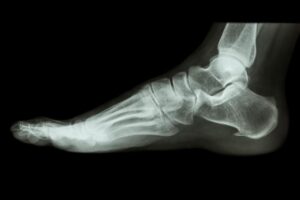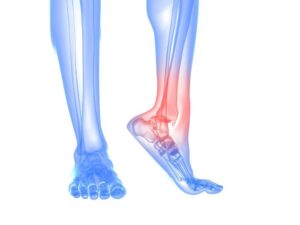What’s Causing Your Painful Morton’s Neuroma?

Are you experiencing pain or a burning sensation in the front half of your foot but don’t have any visible bumps, cuts, or bruises? If so, it’s possible you have Morton’s neuroma, a painful foot condition that doesn’t come with any obvious visual markers.
According to experienced Arizona Foot Health podiatrists Ryan Golub, DPM, and Zachary Flynn, DPM, AACFAS, in Phoenix, Arizona, Morton’s neuroma has several potential causes, and identifying the cause helps with treatment. Keep reading to learn what causes Morton’s neuroma, and the ways you can get relief.
What is Morton’s neuroma?
When nerve tissues are irritated in your body, they can thicken, which causes a neuroma in the area. The irritation of the nerve located between your third and fourth toe, called Morton’s neuroma, is one of the most common types of neuromas.
When a neuroma is created, it causes the nerve to get compressed, causing it to thicken and become enlarged. When you develop Morton’s neuroma, you might experience pain, irritation, a burning sensation, numbness, or tingling by your third and fourth toes. It might also feel like you have a sock or object bunched up or stuck by the ball of your foot.
Morton’s neuroma is extremely painful and can make walking difficult. Without treatment, the damage to your nerve can be permanent.
Causes of Morton’s neuroma
You can develop Morton’s neuroma for various reasons. These are some of the most common sources of your condition.
Choice of footwear
Frequently wearing any shoes that are too tight, especially in the front toebox, increases your likelihood of developing Morton’s neuroma. This is true of any ill-fitting pair, but the risk is elevated with high heels.
The shape of high heels causes your feet to slide forward, creating cramping and tightness in the front of your foot. The risk is higher if your heels do not fit properly.
Participating in sports
You’re more likely to get Morton’s neuroma if you participate in high impact sports that put strain on the ball of your foot, including any sports with frequent stopping, starting, running, or jumping.
Sports where you wear tight footwear, like skiing or rock climbing, also put you at risk. Make sure the shoes you wear for any sport fit correctly and offer sufficient support.
Feet deformities
Some foot conditions, which sometimes, but not always, are caused by your lifestyle, increase your odds of experiencing Morton’s neuroma. These include flat feet, hammertoes, bunions, and high arches.
Injury or trauma
If you’ve previously injured your foot from sports, footwear, or another cause, or had any other similar kind of foot trauma, you have a greater likelihood of getting Morton’s neuroma.
Treating Morton’s neuroma
Our podiatrists can treat many cases of Morton’s neuroma with conservative, nonsurgical measures. Initial treatment can include changing your shoes, resting from athletic activities, and wearing custom orthotics.
Over the counter pain medications, injections, and icing the area can also help. If conservative treatments don’t work, our podiatrists may recommend surgery to decompress or remove the painful nerve.
If you have painful symptoms of Morton’s neuroma, our team determines the cause and makes a treatment plan that helps your pain. For more information, request an appointment online or at 602-973-3888.
You Might Also Enjoy...
The Achilles Heel
Given Arizona’s climate, patients are able to remain active year round. It’s why we all chose to live here. But…
Alleviating Back Pain and Other Benefits of Custom Orthotics You Didn’t Know About
Would you ever imagine that custom foot orthotics could improve your quality of life? That’s what many people say after…
9 Helpful Tips to Prepare Your Home Before Bunion Surgery
When moderate interventions, such as wearing wider shoes or using pads in your shoes, fail to ease your bunion pain…
When Should You Go to the Doctor for an Ingrown Toenail?
In most cases, you can nurse an ingrown toenail at home with over-the-counter pain medication, topical antibiotic creams, and soaking…
6 Home Exercises to Keep Your Ankles Strong
Ankles that feel wobbly and weak are vulnerable to injury. If you play sports, run, jump, or just walk often,…
Is Surgery My Best Option For Treating Bunions?
You have a bunion and it isn’t pretty, but if your bunion is small enough, or doesn’t hurt, you may…






